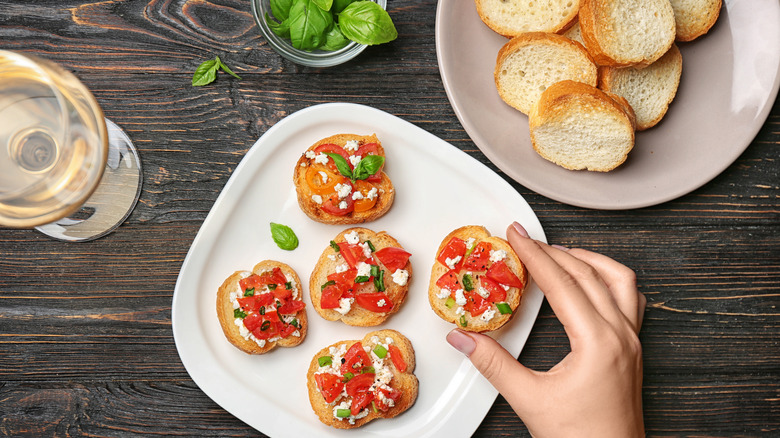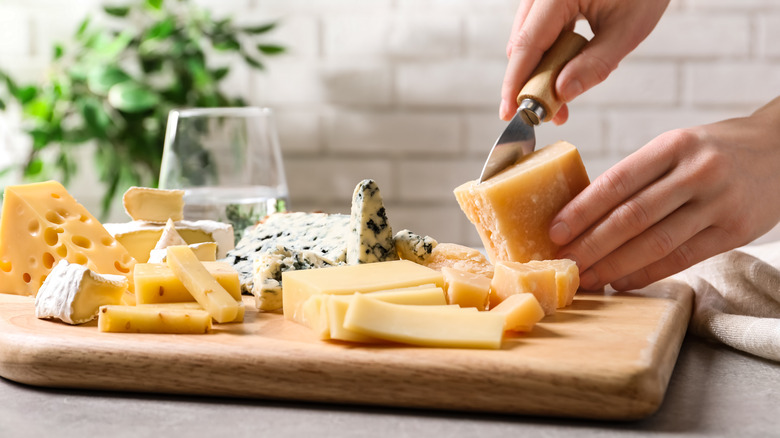What It Actually Means To 'Expand Your Palate'
It can be a little perplexing to watch wine tasters take a sip from a glass, then describe the carnival of sensations they taste inside of it. Maybe it's "freshly baked apple pie mingling with the aroma of autumn blackberry bushes" or "winged cherries fluttering up to chocolate meringue clouds." Either way, you might ask yourself: "How can anyone taste all that in a bottle of vino?" The answer actually lies in the sophistication of their palate, which brings a whole new dimension to their enjoyment of food and drink. This is why everyone — from chefs to restaurant critics to die-hard foodies — tends to work on expanding theirs. Because, luckily, a good palate isn't just a "born with it" thing.
In fact, according to "Flavor" by Bob Holmes, genetics only account for about 20% of your sense of taste — the other 80% is a frontier country just waiting to be cultivated (via The Unconventional Route). In other words, like an eye for art or ear for music, your taste buds can be developed and refined over time. Not doing so is like listening to opera on old, muffled headphones your whole life when you could be regaling yourself with arias performed live. But what does it actually mean to "expand your palate"?
Here's how to wake up your taste buds
Developing your taste buds is just heightening their discernment so you can pick out new subtleties in food and drink, per Forklift & Palate. With a more refined palate, you might pick up on vanilla notes in your morning coffee, biscuity flavors in that celebration champagne, or citrusy elements in that artisanal chocolate. But how do you go about training your palate? For starters, it's worth remembering that the human tongue can taste five main flavors: bitter, sour, sweet, salty, and umami. So the first step is learning to distinguish between these.
With this in mind, chef Wolfgang Puck makes four recommendations for cultivating your taste buds (via MasterClass). These include seasoning your food slowly, so that you avoid oversalting it and burying other taste layers. You should also toast your spices to bring out the flavors, which trains your tongue to recognize their different identities. He also suggests investing in high-quality olive oil, as it is a flavor enhancer. Finally, he explains that bringing balance to your food is key, so adding a harmonizing element — like a squeeze of lemon juice in a pea soup — lets other essences come forward.
After you've trained yourself to pick out the five basic flavors, you can start delving into finer categories like grassy, floral, woody, fruity, smoky, nutty, or earthy. In fact, according to Niki Segnit's "The Flavor Thesaurus," there are 99 different flavors across 16 categories to get to know.
Don't forget the role that aroma plays
Your nose is one of your best tools when it comes to developing your palate. It can actually pick up between 10,000 and 1 trillion different aromas, working together with your sense of taste to form your perception of flavor (via Ask the Scientists). So get into the habit of sniffing your food before savoring it, as you'll better tune into what you're consuming.
Plus, if you can brave it, try eliminating sweet and salty foods for at least a month, per One Medical. This will turn your palate into a blank slate, allowing you to refine your responses to other flavors. Healthline also suggests trying out new ingredients on a regular basis in order to awaken your taste buds and cleansing your palate by drinking a sip of water before you switch between different foods.
When you're better able to pick up nuances in food, you can perceive fine differences in similar items (via Martha Stewart). For instance, basil, fennel, and endive all contain notes of licorice, but each expresses it differently. By getting better at noticing this, you deepen your relationship with food and cooking. You can even take this further by closing your eyes while nibbling on ingredients that share similar flavors.
Overall, expanding your palate is all about practice, exploration, and experimentation. So why not take your taste buds on a trip around the world from the comfort of your kitchen? They'll thank you for it.


